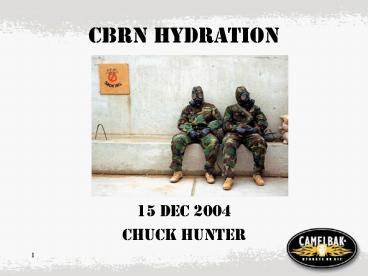CBRN Hydration - PowerPoint PPT Presentation
1 / 13
Title:
CBRN Hydration
Description:
US Army Hydration Requirements. 5. Operational Hydration Challenges. How ... US ... Matches current standard issues interfaces for training and ... – PowerPoint PPT presentation
Number of Views:237
Avg rating:3.0/5.0
Title: CBRN Hydration
1
CBRN Hydration
15 Dec 2004 Chuck Hunter
2
Hydrate or Die
The only two things you really need to fight a
war are water and bullets. - unknown smart
person
3
Heat Illness/injury in the Army
- From 1993-2002, 1,440 Army personnel admitted to
hospital for treatment of heat injury. (Avg. rate
of 3.0 per 1,000 person-yrs.) - From 1997-2002, 8,084 soldiers were treated as
outpatients for heat illness.
4
US Army Hydration Requirements
5
Operational Hydration Challenges
- How to drink continuously
- How to stay operational
- How to have enough water available
- How not to drink to much to fast
6
Basic CamelBak ConceptClean or CBRN Environment
- Water readily available
- Hands-free
- Drink a little bit all the time
- Sufficient, quiet, durable, operational across
all spectrums
7
US Army SHS Study 2000
SUBJECT Memorandum Report Nuclear,
Biological, Chemical (NBC) Soldier Hydration
System Limited Objective Experiment
b. Conclusion(s) The SHS experiment
confirmed that a hydration system which enables
soldiers to hydrate on the move and during the
performance of mission essential tasks is
preferred over the current canteen method for
hydrating in MOPP IV. c. Recommendation
(s) Based on the enhanced hydration capability
the SHS provides to soldiers in MOPP IV, we
recommend that a formal requirements document be
written to support soldier hydration in a
nuclear, biological, chemical (NBC)/toxic
industrial chemical (TIC) environment.
8
Challenges For CBRN Hydration
- Flexible vs. rigid
- Connections mask interface
- Water flow rate
- Mask personnel interface
- Test standards
- Materials
- Full system
- Field testing
- Interoperability
- Training
9
1st/2nd Generation Systems
- Flexible
- Heavy
- Expensive
- Hard to manufacture
- Training issues
- Interoperability issues
10
4th Generation Systems
- Very flexible
- Light weight
- Significantly less expensive
- Manufacturing flexibility
- Matches current standard issues interfaces for
training and interoperability
11
Other Issues
- Water storage in a chem environment
- Refill in a chem environment
- Disposal
12
Questions??
13
OK, lets go drink
- (Water of course)































